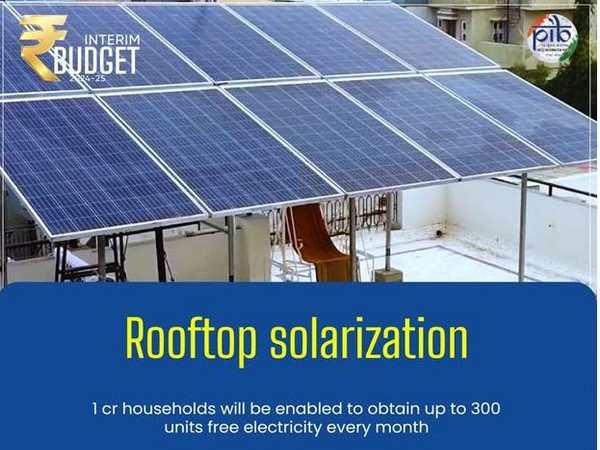During the presentation of the interim budget in Parliament on Thursday, Union Finance Minister Nirmala Sitharaman unveiled a series of initiatives aimed at advancing renewable energy.
Sitharaman highlighted a key initiative, stating that one crore households could benefit from 300 units of free electricity per month through rooftop solarisation.
“Through rooftop solarisation, one crore households will be enabled to obtain up to 300 units free electricity every month. This scheme follows the resolve of the Prime Minister on the historic day of the consecration of Ram Mandir in Ayodhya,” Sitharaman announced, referring to Prime Minister Narendra Modi’s announcement on January 22, where he declared the launch of the Pradhan Mantri Suryoday Yojna in one crore houses following his visit to Ayodhya.
The government anticipates several advantages from this solarisation initiative, including annual savings ranging from Rs 15,000-18,000 crore for households due to free solar electricity, selling surplus energy to distribution companies, facilitating electric vehicle charging, creating entrepreneurial opportunities for supply and installation vendors, and generating employment opportunities for skilled youth in manufacturing, installation, and maintenance.
Sitharaman said: “Expected benefits include annual household savings of Rs 15,000-18,000 from free solar electricity and selling surplus to distribution companies.”
In alignment with the goal of achieving ‘net-zero’ by 2070, Sitharaman proposed viability gap funding for harnessing offshore wind energy potential with an initial capacity of one gigawatt. Additionally, plans were outlined for the establishment of coal gasification and liquefaction capacity of 100 MT by 2030, aiming to reduce imports of natural gas, methanol, and ammonia.
Further measures announced included phased mandatory blending of Compressed Bio Gas (CBG) in Compressed Natural Gas (CNG) for transportation and Piped Natural Gas (PNG) for domestic purposes. Financial assistance would be extended for the procurement of biomass aggregation machinery to support collection.
In the context of electric vehicles, Sitharaman reiterated the government’s commitment to expanding and strengthening the e-vehicle ecosystem by supporting manufacturing and charging infrastructure. She also indicated encouragement for greater adoption of e-buses in public transport networks through a payment security mechanism.
To foster green growth, Sitharaman proposed a novel scheme for bio-manufacturing and bio-foundry, promoting environmentally friendly alternatives like biodegradable polymers, bio-plastics, bio-pharmaceuticals, and bio-agri-inputs.
“This scheme is poised to transform our current consumptive manufacturing paradigm into one based on regenerative principles,” she said.
(Inputs from ANI)














